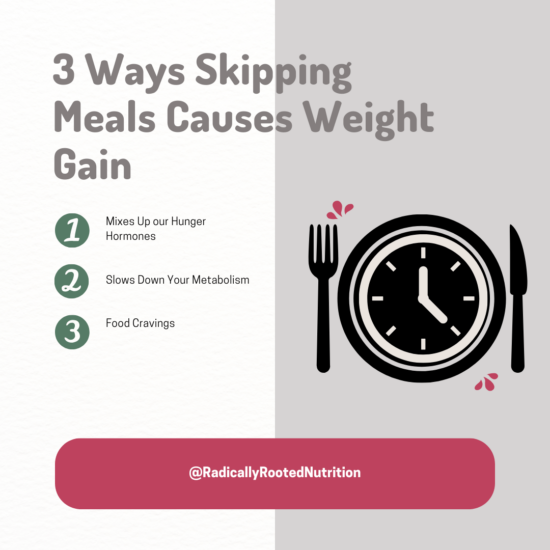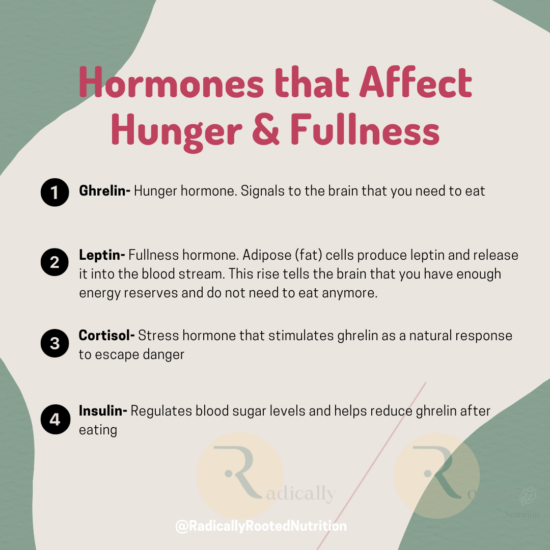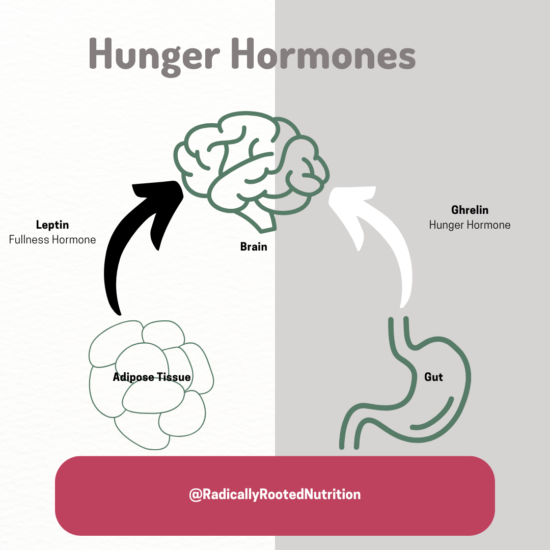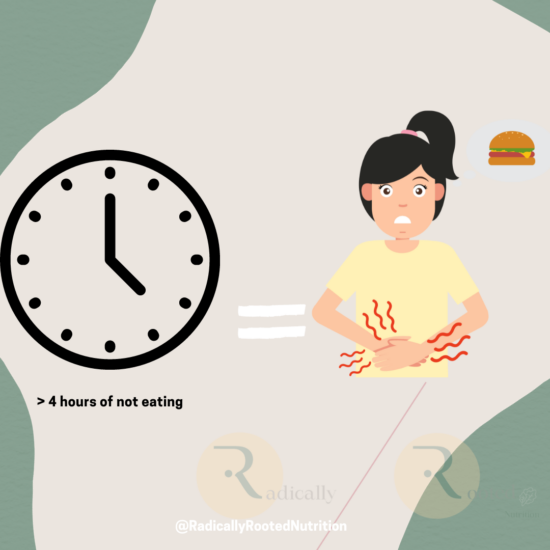3 Ways Skipping Meals Causes Weight Gain
When I talk to clients who are struggling to lose weight, I often hear them say that they hardly eating and don’t understand why they’re not losing weight. However, upon further examination of their daily diet, they only eat one meal daily, either in the morning or at night. This leaves them with long periods of not eating throughout the day. It’s a common misconception that not eating will lead to weight loss. While it’s true that calorie intake versus calorie output is an important factor, not eating for long periods oftentimes hinders weight loss and can lead to weight gain. I mean, who would want to go all day without eating? Not me! Let me explain the three ways skipping meals causes weight gain and hinders weight loss.

#1- Skipping Meals Causes Weight Gain by Mixing Up our Hunger Hormones
Our bodies have built-in hunger and fullness cues in the form of hormones. The four hormones that play a role in these processes are insulin, leptin, cortisol and ghrelin. The image below illustrates each of the four hormones and their role. These hormones play a significant role in signaling when it’s time to eat and when to stop. Ghrelin is our hunger hormone which signals to the brain when the stomach is empty and its time to eat. Leptin is our fullness hormone and tells the brain there are enough energy reserves and reduces the desire to eat.
Ignoring these cues can lead to hormone imbalances. Hunger is part of a negative feedback loop, which means that the only way to decrease feelings of hunger is to eat. When you skip meals, your body will produce more and more ghrelin. Too much ghrelin gives you a more robust appetite, causing you to overeat frequently. Overeating leads to consuming excess calories and storing those extra calories as fat. At the same time, it will produce less leptin, the hormone that decreases appetite, making it harder for you to know when you are full causing overeating.
When we become excessively hungry, it is human nature to overeat as if food is scarce. This leads to overeating or binge eating when you do finally eat. So, while you may be skipping meals, you are making up for those calories (or more) when you do eat.

#2- Skipping Meals Causes Weight Gain by Slowing Down Our Metabolism
We’ve all heard that when we don’t eat for a long period of time and then eat, our body holds onto this energy as fat. And, that is the truth!
Initially skipping meals may contribute to weight loss but over time it reduces the body’s metabolism which makes it harder to lose weight and eventually cause weight gain.
Our Resting metabolic rate (RMR) refers to the amount of energy the body uses while at rest. It’s the number of calories the body would burn if we were lying down all day. The thermic effect of food (TEF) is a part of this resting metabolism and accounts for the energy our body uses to digest, absorb, and metabolize the food we eat. So, while we consume calories, we also burn calories while digesting and metabolizing food. On average, TEF accounts for 10% of energy used. So, let’s talk about why this matters.
Skipping meals regularly can slow down this ‘RMR’. When we skip meals, the body goes into survival mode and begins to burn fewer calories throughout the day. This happens because your brain signals your body to slow down its functions to conserve or hold onto energy for those prolonged periods of not eating. The body starts storing the food as fat to avoid starvation.
When your body runs out of glucose, (its preferred energy source), it starts burning fat and protein, which slows down your metabolism further. It’s worth noting that lean body mass helps to INCREASE the metabolism, so burning protein can be detrimental to your weight loss efforts too.

#3- Skipping Meals Causes Weight Gain by Leading to Food Cravings
As a result of skipping meals, our blood sugar levels drop. A low blood sugar level can lead to strong cravings, especially for foods high in simple carbs and sugar, instead of turning to healthy, nutrient-dense foods. These simple carbs and sugary foods, provide quick, short bursts of energy which is exactly what your body is looking for. However, these bursts of energy do not last very long and then they lead to crashing and sudden tiredness.
Skipping meals can lead to a loss of control over eating your next meal or snack, especially if you choose refined carbohydrate sources. I mean, think about it, when we are really hungry and we reach for a bag of pretzels, it can be almost impossible to stop.
Attempting to lose weight by skipping meals or ignoring hunger cues backfires and can lead to some serious binge eating. In a 2021 retrospective study conducted on university students, skipping dinner predicted weight gain and overweight/obesity.

Recommendations
Whether you are extremely busy and have no time for meals or you are skipping meals to save some calories, it can cause weight gain and cravings for foods that are high in calories, carbohydrates, simple sugars and low in nutrients. I always make these recommendations to clients when it comes to making sure you are eating throughout the day…
- Plan and prepare. Write down your menu for each day of the week before you go to the grocery store. Buy all your ingredients and make sure to pack your lunch/snacks the night before.
- Some healthy on-the-go snacks could be yogurt, cottage cheese, hummus, fruits, carrots, cucumbers, peppers, nuts, cheese.
- Set a timer to make sure you are eating something every 3 hours. The most crucial time is usually the time between lunch and dinner when you have this sudden urge of hunger. Eating something that is healthy and satisfying will prevent the urge to overeat at dinner and after dinner.
- Instead of opting for foods that are high in calories, carbohydrates and sugar, choose nutrient-dense foods that keep you full and more satisfied for longer.
- Some examples are high-fiber toast with low-fat cheese and cucumbers, low-sodium turkey lettuce wraps, and Greek yogurt with berries.
- Practice mindful eating by checking in with your hunger and fullness cues to avoid overeating.
- Prep ingredients for the week. Wash and chop vegetables and pre-portion out herbs, spices and condiments so that when it comes time to make the meal, most of the work is already done. If breakfast is tough in the morning, try overnight oats, yogurt and hardboiled eggs as a quick and easy breakfast option on-the-go.
- Cook larger portions. Dinner can be great for lunch the next day. Create larger portions and pre-portion the leftovers into containers for lunch-on-the-go during the week.
It is recommended to eat balanced, regular meals throughout the day to support a healthy metabolism and prevent excessive hunger that can lead to overeating. It is important to note that there is no research on skipping a meal occasionally on weight gain. It is important to speak with a dietitian to get expert advice and recommendations based on your individual body and health needs.
Bottom Line
In summary, skipping meals can cause food cravings due to the body’s survival response, the imbalance of hunger hormones, and a slower metabolism, all of which can lead to overeating and a preference for unhealthy food choices and ultimately weight gain.



